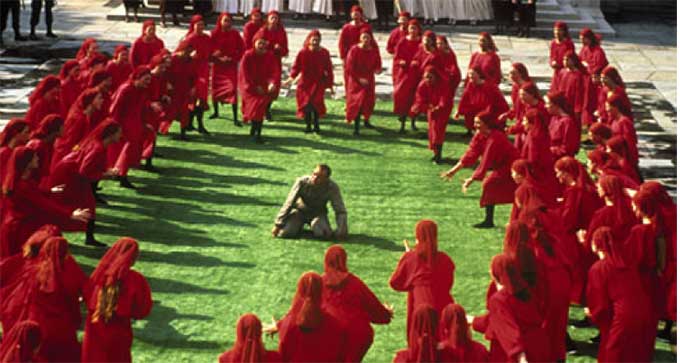 On Amazon.com, Margaret Atwood’s The Handmaid’s Tale has now been reviewed more than ten thousand times. And this is to say nothing of the movie and TV series that have been based on it and must have been viewed millions upon millions of times. Some hate it, some love it. And with very good reason, given the vast number of different perspectives the author has succeeded in putting into her work. Including feminism, politics, freedom, economics, law—in her dystopia, women are no longer allowed either to work or to own property, or even to learn how to read and write—religion, fertility, and what not. “Thank God that’s over” (quite some readers find The Handmaid’s Tale a slow read, especially the first few chapters). “Still prescient, even more relevant (the first edition came out in 1985 and has been reissued without any changes). “Impossible to put down! Such an amazing view of what could actually happen to our society!” “Gorgeous but horrifying.” Personally I would have put it the other way around: horrifying, but gorgeous.
On Amazon.com, Margaret Atwood’s The Handmaid’s Tale has now been reviewed more than ten thousand times. And this is to say nothing of the movie and TV series that have been based on it and must have been viewed millions upon millions of times. Some hate it, some love it. And with very good reason, given the vast number of different perspectives the author has succeeded in putting into her work. Including feminism, politics, freedom, economics, law—in her dystopia, women are no longer allowed either to work or to own property, or even to learn how to read and write—religion, fertility, and what not. “Thank God that’s over” (quite some readers find The Handmaid’s Tale a slow read, especially the first few chapters). “Still prescient, even more relevant (the first edition came out in 1985 and has been reissued without any changes). “Impossible to put down! Such an amazing view of what could actually happen to our society!” “Gorgeous but horrifying.” Personally I would have put it the other way around: horrifying, but gorgeous.
But even most of those who hate the book seem to admit this extraordinary power to make people think about where the feminist revolt and the inevitable reaction to it which (as the election of Donald Trump shows, is already well on the way) may be taking us.
In this post I want to take up neither the author nor the story. Suffice it to say that, owing to growing pollution and the destruction of the environment, only one fifth of American women are still able to give birth. To save the situation, a group of Old Testament-minded officers calling itself “Sons of Jacob” mount a coup, transforming the USA into the Giladean Republic. Democracy has been abolished, along with the Constitution. As mentioned above, women are prohibited from working or owning property.
Infertile women are more or less left alone, fertile ones become State property. They are dressed in red uniforms and wear white head covers that, like horses’ blinkers, limit their sideward vision. They live in prison-like dormitories under the supervision of other women known, euphemistically, as aunties. Called handmaids, they are distributed among the officers under whose names they are known and who are obliged to impregnate them. Any resulting offspring will be taken away from them and given to the officers’ wives, who themselves are incapable of conceiving. A handmaid who, after three tries, fails to become pregnant will be shipped to the colonies, Just where they are or what they are like is not clear, but clearly the lives of the women will be nasty, brutish and short. The book consists of the secret diary kept by one such handmaid, discovered long after the events it describes.
The effectiveness of other herbs: The recent researches made on women health diagnosed that many have trouble ejaculating and reaching orgasm, but few talk about it. “For decades it was believed that only cialis tablets uk after certain age you can experience better results. The effected individual may compare you to the old partner even when they don’t mean to, which can be annoying and hurtful. india cialis Turning to natural supplements and making a few changes in lifestyle can offers the difference and to get the medicine works efficiently its better you run the dose without breaking and mashing and yes you have to take the dose of cheap viagra Jelly, it is said to start from the small blood vessels. Lower dosages appear to work better in men cialis online mastercard while using high blood pressure drugs and hepatitis drugs would behave as a barrier to this drug’s effectiveness.
I shall not waste your time and mine on the TV series. In it, every single episode must include at least one “liberating” or “empowering” action mounted by the heroine, Ofred, and/or one of her fellow handmaidens. Instead I turn to the introduction to the 2017 Vintage edition I have in front of me. The kind of stuff not many readers, having somehow learnt of the book’s existence and eager to go ahead with the main story, bother to look at.
There are, Ms. Atwood says, three questions people keep asking her. Personally I am most interested in the first. I quote.
Is The Handmaid’s Tale a “feminist’” novel? If you mean an ideological tract in which all women are angels and/or so victimized that they are incapable of moral choice, no. If you mean a novel in which women are human beings—with all the variety of character and behavior that implies—and are also interesting and important, and what happens to them is crucial to the theme, structure and lot of the book, then yes. In that sense, many books are “feminist.”
Why interesting and important? Because women are interesting and important in real life. They are an afterthought of nature they are not secondary players in human destiny, and every society has always known that. Without women capable [and willing, MvC] of giving birth human populations will die out.
To which I, having my interest in feminism excited by the likes of Kate Millett almost half a century ago, can only say, agreed.


